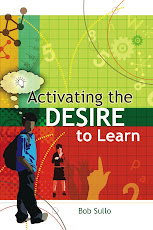As schools across America prepare to begin a new academic year, teachers face expectations from various sources, including parents, building leaders, department heads, and central office. With most states opting into the the Common Core State Standards Initiative, yet another set of expectations is in play. It’s all part of today’s educational landscape.
The problem with these expectations - perhaps “limitation” is a more accurate word - is that they are external. There’s not necessarily anything wrong with them, but people are ultimately motivated from the inside. The expectations of others and externally imposed standards only take us so far. To reach the highest level of achievement, professionalism, and motivation, we need to develop internal expectations and standards.
I invite every educator to create their own expectations for the coming year, using WDEP, a model developed by Bob Wubbolding, Senior Faculty member of The William Glasser Institute.
W: Want. It’s obvious what others want and expect from you this school year. Beyond that, what do you want for yourself and from yourself? Is it that more students achieve at a higher level? Is it to nurture more collaborative relationships with parents? To cut down on the number of disciplinary infractions in the classroom? To infuse more technology into your teaching? To begin or complete an advanced degree? The list of potential “wants” is endless. Identify a few that really matter to you. Aside from all the externally imposed - and very important - expectations, what do you want for and from yourself this school year?
D: Doing. One of the core principles of Choice Theory is that all behavior is purposeful. We behave in an effort to achieve what we want. Once you have identified what you want, determine what you need to do to turn your goal(s) into reality. Having a clearly identified want is necessary, but not sufficient. Life doesn’t simply happen to us. If you want something, you need to develop clarity about what you need to do to achieve it.
E: Evaluation. How will you know if you have achieved what you want (or are heading in the right direction)? Some goals are more easily evaluated. If you have a goal of making contact with the family of each student, you can objectively track your progress. Some goals are less tangible. Suppose, for example, you want to enjoy even better relationships with your professional colleagues. How will you measure it? What criteria will inform you of your progress so you can effectively self-evaluate. Ongoing self-evaluation helps you maintain what’s working or change your actions to become more effective.
P: Plan. Words, theory, and ideas are nice, but don’t mean much unless they are put into action. With a new school year about to begin, what’s your specific plan of action to become more like the educator you’d like to be? When will you begin? If you don’t commit to a specific plan, are you likely to have the kind of professional experience you want for yourself this year? How badly do you want what you say you want? Enough to think about it? Talk about it? Do it? Creating and implementing an action plan will help you experience the success you want for yourself.
Lots of people in various roles will expect things from you this school year. As a teacher, you’ll identify expectations for your students. That’s the way it works. I encourage you to go beyond the experience of external expectations this year and identify your own set of internally generated expectations.
***
As always, if you enjoyed this and found it useful, please send the link to your friends. Thanks.
Bob Sullo
For information about books by Bob Sullo and to schedule a keynote, workshop, or series for your school, agency, or parent group visit www.internalmotivation.net





